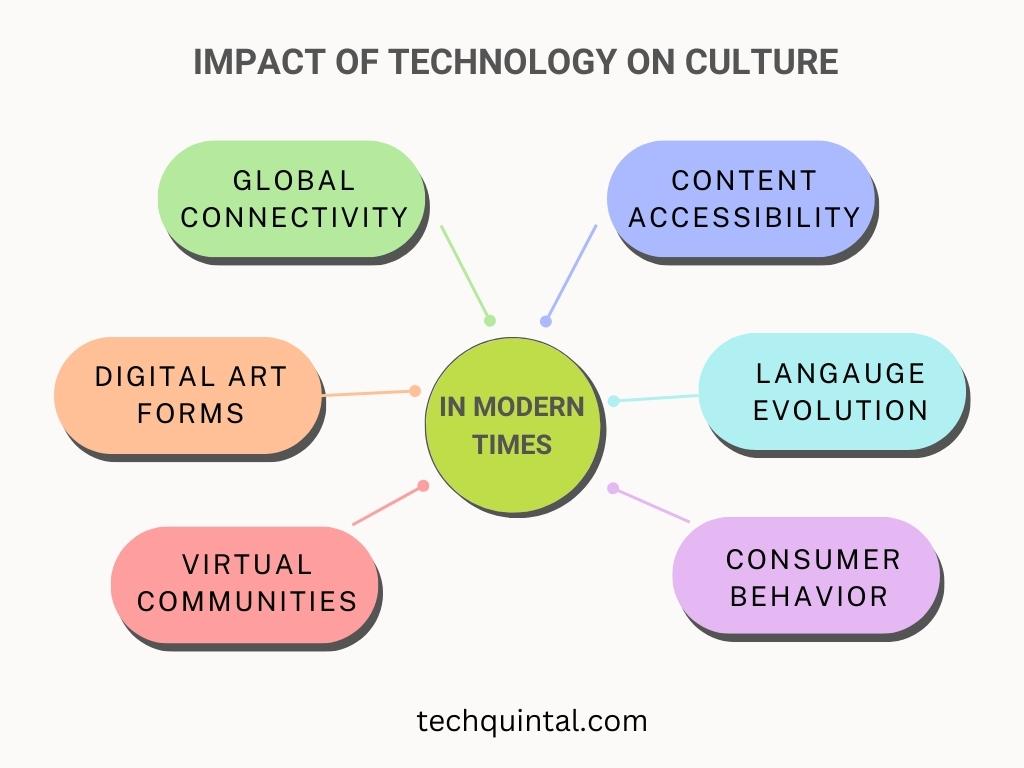
Modern times look nothing like they were a few decades ago. That’s how influential technology has been to us. Looking back makes us realize how convenient our lives are now in comparison, but also how dependent we have become on modern technology. That should raise an alarm, but considering it is here to stay, we can instead focus on technological influence. In this analysis, we will explicitly study the technology vs culture relationship. We will look at how culture drives the development of technology, which in turn influences the culture itself. Before that, let’s explore the importance of technology and culture in current times.
Technology Meaning
Technology is a term for the tools and machines we use to solve our problems and make our lives better. It can be anything from an ancient hammer to a modern supercomputer. No matter where you go or which field you choose to study, you will find it very hard to not spot the impact of technology in it. From our personal lives to professional lives, everything has become so reliant on technology.
Without our daily gadgets, we will find it extremely hard to even pass a single day. It is used for communicating with our friends, treat our illness, and create a better future. The best thing about technology is that it is always changing and getting better. It leads to new inventions and allows us to do amazing things efficiently.
What is Culture?
A culture is a term that is not understood by many. We use it for addressing pretty much everything about how a particular group of society lives. But it is not just about that. It is not only about physical appearance and rituals, but culture is the shared beliefs, values, customs, behaviors, and even artifacts of a group of people or society.
Without a doubt, culture is a complex subject. And if you are not someone who is not deeply interested in it, you will find it very hard to understand its meaning.
Our culture helps shape our identity, influences our worldview, and guides us in adapting ourselves to the environment. It also determines how we interact with new people and their own culture. It is dynamic and always evolving. It is not just about how we have lived in the past, but it is also about how we live in the present and future.
The role of technology in our lives
The improved standard of living nowadays is the upshot of advancements in technology. Society as a whole is more connected now than at any other time in history. This is because the internet and devices create an online medium for people across the globe to communicate.
Not only that, it allows us to gain knowledge and understand various cultures better. Technological advancement also provides tools to develop good relationships with family and other members of our society.
Along with broadening our horizons, technology gives access to accurate statistics in real-time. That way, businesses don’t have to wait weeks or months to get the data to make informed business decisions. What follows are improved strategies, which eventually help businesses prosper.
Similarly, the implementation of technology in various sectors including communication, transportation, and education has saved time and resources while improving the outcome.
Significance of culture in our lives
Culture is the driving force behind enhancing the quality of life and increasing the well-being of individuals and society. It is the foundation that determines the growth of the community. It influences their perspective, value, and their responses to various situations.
Moreover, it gives people a unique identity, separating them from people belonging to different cultures. Most importantly, culture provides economic and social benefits.
Considering technology shapes the culture and culture shapes the thinking, behavior, and personality of individuals, it can be said that it is essential for living. The culture is represented in the form of art, literature, religion, and language. It influences the structure of thinking, so people belonging to individualistic cultures perceive success as personal efforts whereas people belonging to collectivist cultures perceive it as joint actions.
Furthermore, it is the culture that brings the people together and bonds them in harmony.
Technology vs culture: What is the fuss about?
In the introduction, we highlighted that culture affects technology, which then brings cultural change. It is night time we look at their relationship in detail.
Culture drives technological innovation
Technology strives to solve real-life problems. When cultural change forced a reduction in commuting hours, people used technology to create a remote workforce. It provided all the essential tools that ensured swift working from home while still improving efficiency.
Take the recent pandemic for example, and you’ll see it facilitated working from anywhere at any time. Similarly, the changing cultural demands necessitate the use of technology to fulfill them.
Research and studies found that culture plays an important role in technological innovation. The culture that promoted cooperation and instilled responsibility and accountability among the members led to increased effectiveness and better technological outcomes. Culture plays a critical role in the ability of businesses to execute in the marketplace.
Technology brings cultural change
With the introduction of modern technology such as the internet and social media, people’s preferences have shifted towards online communication over face-to-face contact. In other words, instead of seeing each other in person, people rely on messages, audio, video, and even VR (Virtual Reality).
The number of people who visit cinemas is dropping in favor of subscribing to streaming services and other forms of entertainment. We also have cloud technology that transformed the way organizations develop and deploy software. Enterprises shifted from a culture of data centers to public and private clouds.
Let’s take business as context, for instance. Technology has provided access to resources around the clock. Consequently, employees can work on a flexible schedule instead of the traditional 9-to-5 structure. Technology is essential for businesses to prosper, a fact they understand. Therefore, cultural change is brought to embrace the technology.
This is achieved in the form of aligning the business’s vision with the digital revolution and communicating both to the employees. It results in a workforce culture that is willing to adopt technological advancement for growth.
Examples of a bond between culture and technology
Now that we understand the affinity between technology and culture, let us take a glimpse at a few examples to explore both further.
Source of urbanization
Before modern technology, most families worked on farms. Then advanced technology arrived, introducing machinery and reducing human labor, eventually leading to urbanization. People had large families as they needed them to work on farms. But as cutting-edge technology progressed, the need to have big families vanished. Modern society started to consist of smaller families, and let parents have children out of desire, not a necessity.
Evolution of lighting
In ancient times, people used candles or reflected mirrors to light their houses. With the advancement of technology, we saw the introduction of the fluorescent bulb. Initially, a section of society accepted the new technology. Then, eventually, the rest of the culture integrated bulbs as the primary form of lighting. The same is happening with LED (Light Emitting Diode) technology.
Existence of a refrigerator
In earlier times, people used salt on meat and dried it afterward so it could last longer. Then, technology came into the picture with the invention of the refrigerator. It eventually led to a cultural shift and more people integrated modern home appliances into their lifestyle.
Coming to the end of the examination, you might have realized two things. Changes in technology can result in cultural transition, sure, but vice versa is also true. That’s how technology and culture work hand in hand instead of vs (versus) each other. This creates a better society, improves the quality of our lives, and leads to the continuous advancement of our civilization.
Impacts of Technology On Culture

Technology has brought people closer to each other with fast communication methods. But there are some negative impacts of technology on culture that need to be taken care of before it gets too late:
- Technology has brought people closer, but it has also decreased face-to-face interactions between people. People are spending way too much time on mobile phones than talking with each other.
- When things can get done with a click, no one wants to move out. High-tech games and other social media apps have made people not leave their rooms, which has reduced physical engagement.
- There are also high chances of miscommunication online which can result in bad things. Also, stereotypes and misrepresentations have become common due to social media.
Here is a table showing the balance act between technology and culture:
| Aspect | Positive Impacts | Negative Impacts |
| Communication | Instant global connectivity, social media networks | Reduced face-to-face interactions, potential miscommunications |
| Information Access | Easy access to diverse cultural content | Cultural dilution, loss of traditional knowledge |
| Cultural Preservation | Digital archiving, virtual museums | Over-reliance on digital, physical artifacts neglected |
| Cultural Exchange | Global collaboration, cross-cultural interactions | Cultural homogenization, loss of uniqueness |